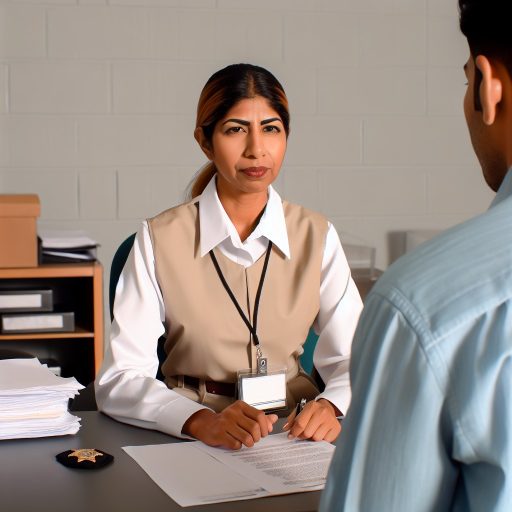Probation officers play a crucial role in the juvenile justice system by monitoring and supervising young offenders.
They ensure that juveniles follow court-ordered conditions, such as attending counseling sessions or completing community service.
Probation officers work closely with juveniles to develop individualized rehabilitation plans tailored to their specific needs.
These plans may include educational programs, substance abuse treatment, or mental health services to address underlying issues.
By providing support and guidance, probation officers help juveniles make positive changes and avoid reoffending in the future.
They serve as mentors and advocates, working to rebuild relationships with families and communities for successful reintegration.
Probation officers also collaborate with other professionals, such as social workers and therapists, to ensure comprehensive care for juveniles.
Their presence in the juvenile justice system is essential for promoting accountability, rehabilitation, and long-term success for young offenders.
Duties of a Probation Officer:
Probation officers monitor juvenile offenders to ensure compliance with court-ordered conditions.
They conduct home visits to assess the living situation and provide guidance and support.
Probation officers recommend appropriate interventions based on the needs of the juvenile and the offense committed.
They work collaboratively with social workers to address any underlying issues that may be contributing to delinquent behavior.
Probation officers also coordinate with counselors to provide mental health services and support to offenders.
They serve as a link between the court system, law enforcement, and community organizations to provide a holistic approach to rehabilitation.
Probation officers develop individualized treatment plans for each juvenile offender to address their specific needs and challenges.
They provide ongoing support and guidance to help offenders successfully reintegrate into society and avoid further criminal behavior.
Probation officers also conduct regular assessments to track progress and make adjustments to the treatment plan as needed.
They serve as advocates for juvenile offenders, helping them access resources and services to support their rehabilitation and overall well-being.
Role in Case Management:
Probation officers play a crucial role in developing individualized case plans for juvenile offenders.
They assess the needs of each offender and create a plan that addresses their specific circumstances.
Transform Your Career Today
Unlock a personalized career strategy that drives real results. Get tailored advice and a roadmap designed just for you.
Start NowThese case plans typically include goals for rehabilitation, education, and behavior modification.
Probation officers work closely with the juvenile offender, their family, and other stakeholders to ensure that the plan is effective.
They regularly monitor the progress of the offender and adjust the interventions as needed to promote positive outcomes.
Probation officers track the offender’s compliance with the terms of their probation and provide support and guidance when necessary.
By closely managing each case, probation officers aim to reduce recidivism and help juvenile offenders successfully reintegrate into society.
They also collaborate with other professionals in the juvenile justice system to ensure that the needs of the offender are being met.
Probation officers play a key role in coordinating services and resources to support the rehabilitation and reintegration of juvenile offenders.
Overall, their involvement in case management is essential for promoting the rehabilitation and reintegration of juvenile offenders.
See Related Content: What Makes a Good TSA Officer: Key Traits and Qualities
Relationship with Juvenile Offenders:
Building trust and rapport is crucial for positive behavior change.
Probation officers act as mentors to guide young individuals.
Communication is key to understand the needs and challenges.
Setting realistic goals and providing support is essential.
Encouraging positive influences and activities promotes growth.
Building a sense of accountability helps in making better choices.
Creating a safe and non-judgmental environment fosters growth.
Using positive reinforcement for good behavior reinforces positive change.
Providing resources and connecting them with helpful programs is beneficial.
Continuous monitoring and feedback ensure progress and success.
Showcase Your Business Today
Reach thousands of readers actively exploring professional services. Publish your business profile and grow your audience now.
Publish NowLearn More: Daily Duties of a Sheriff and Deputy Sheriff
When it comes to working with families as a probation officer in the juvenile justice system, collaboration is key to creating a supportive and stable environment for juvenile offenders.
Probation officers play a crucial role in addressing family dynamics and challenges through providing resources, referrals, and guidance.
Building Trust and Communication:
Probation officers establish trust and open lines of communication with families to better understand the needs and challenges of the juvenile offenders.
By fostering a positive relationship with families, probation officers can work together towards the common goal of rehabilitation and reintegration.
Assessing Family Needs:
Probation officers assess the needs of the families by conducting in-depth interviews and evaluations to identify any underlying issues or challenges that may be impacting the juvenile offender’s behavior.
By understanding the family dynamics, probation officers can tailor their support and interventions accordingly.
Providing Resources and Referrals:
Probation officers connect families with resources and referrals to support services such as counseling, therapy, educational programs, and community resources.
By partnering with external agencies and organizations, probation officers ensure that families have access to the necessary support systems to address their needs.
Developing Individualized Plans:
Probation officers work with families to develop individualized treatment plans that address the specific needs and challenges of the juvenile offender and their family.
These plans may include therapy sessions, educational programs, parental guidance, and other interventions aimed at promoting positive change and growth.
Advocating for Family Involvement:
Probation officers advocate for family involvement in the rehabilitation process by encouraging parents and guardians to actively participate in their child’s treatment and progress.
By promoting family engagement, probation officers empower families to be actively involved in the rehabilitation journey of the juvenile offender.
Monitoring Progress and Providing Guidance:
Probation officers regularly monitor the progress of the juvenile offender and provide guidance and support to families to navigate any challenges or setbacks.
By offering continuous support and guidance, probation officers help families stay motivated and committed to the rehabilitation process.
Addressing Family Dynamics and Challenges:
Probation officers work with families to address underlying issues such as family conflicts, substance abuse, mental health concerns, and other challenges that may be contributing to the juvenile offender’s behavior.
By addressing these dynamics, probation officers help create a more stable and supportive environment for the juvenile offender to thrive.
Probation officers play a vital role in collaborating with families to create a supportive and stable environment for juvenile offenders.
By providing resources, referrals, and guidance, probation officers can address family dynamics and challenges, ultimately working towards the rehabilitation and successful reintegration of juvenile offenders into society.
Delve into the Subject: Park Ranger’s Role in Preserving Historic Sites
Monitoring and Enforcement:
Methods probation officers use to monitor compliance:
- Regular check-ins with the juvenile offender
- Home visits to ensure they are following court orders
- Drug tests to detect substance abuse
- Reviewing school attendance and performance
- Meeting with the juvenile’s family and school officials
Role of probation officers in enforcing consequences:
- Issuing warnings for minor violations
- Implementing community service or restitution for offenses
- Facilitating anger management or counseling programs
- Requesting court hearings for significant breaches
- Working with law enforcement to arrest repeat offenders
Probation officers play a critical role in the juvenile justice system.
They closely monitor the behavior and compliance of juvenile offenders with court orders and conditions of probation.
Through a variety of methods, they ensure that these individuals are adhering to their obligations and staying out of trouble.
One of the primary ways probation officers monitor compliance is through regular check-ins with the juvenile offender.
By maintaining communication and building a rapport with the individual, the officer can assess their progress, address any concerns, and provide guidance on how to stay on the right track.
In addition to check-ins, probation officers also conduct home visits to observe the living conditions and behavior of the juvenile offender.
This allows them to confirm that the individual is following court orders, such as curfews or restrictions on contact with certain individuals, and identify any potential issues that may need to be addressed.
Drug testing is another method used by probation officers to monitor compliance.
By requiring juvenile offenders to undergo regular drug tests, they can detect any substance abuse issues and intervene promptly to provide the necessary assistance and support.
Furthermore, probation officers review the juvenile’s school attendance and performance to ensure they are meeting their educational obligations.
By monitoring their progress in school, the officer can identify any challenges or issues that may be impacting their behavior and address them accordingly.
Probation officers also play a crucial role in working with the juvenile’s family and school officials to provide a support system.
They ensure they are receiving the necessary guidance and resources to succeed.
When it comes to enforcing consequences for violations, probation officers have a range of tools at their disposal.
For minor infractions, they may issue warnings or impose additional requirements, such as community service or restitution, to help the juvenile understand the consequences of their actions.
In more serious cases, probation officers may recommend anger management or counseling programs to address underlying issues contributing to the juvenile’s behavior.
By providing access to these resources, the officer can help the individual develop coping skills and strategies to avoid future offenses.
If the juvenile offender continues to violate the terms of their probation, the probation officer may request court hearings to address the breaches.
Showcase Your Business Today
Reach thousands of readers actively exploring professional services. Publish your business profile and grow your audience now.
Publish NowDuring these hearings, the officer presents evidence of noncompliance and works with the court to determine appropriate consequences, such as additional requirements, supervision, or even incarceration in extreme cases.
In instances where the juvenile offender is a repeat offender or poses a significant risk to themselves or others, probation officers may collaborate with law enforcement to arrest and detain the individual.
By taking swift action in these situations, the officer helps protect the community and ensures that the juvenile is held accountable for their actions.
Overall, probation officers play a crucial role in monitoring and enforcing compliance with court orders and conditions of probation for juvenile offenders.
Through their diligent efforts and close supervision, they help guide these individuals toward rehabilitation and accountability.
This ultimately contributes to a safer and more just society.
Find Out More: Emergency Management Director: Community Preparedness Programs

Risk Assessment and Intervention:
Probation officers assess risks and needs of juvenile offenders using various tools and techniques.
They gather information from family, school, and community to understand the circumstances surrounding the offense.
By conducting interviews and using standardized assessment tools, probation officers can identify factors that contribute to delinquent behavior.
These factors may include family dynamics, substance abuse, mental health issues, or peer influence.
Importance of Evidence-Based Practices:
Probation officers rely on evidence-based practices to determine the most effective interventions for juvenile offenders.
These practices are supported by research and have been shown to reduce recidivism rates among young offenders.
By using evidence-based interventions, probation officers can ensure that they are implementing strategies that have proven to be successful.
This approach helps in providing targeted and tailored services to address the specific needs of each juvenile offender.
Trauma-Informed Care in Decision-Making:
Probation officers recognize the impact of trauma on the lives of juvenile offenders and take a trauma-informed approach in their decision-making process.
They consider past experiences of violence, abuse, or neglect that may have contributed to the youth’s delinquent behavior.
By understanding trauma and its effects, probation officers can respond to the needs of juvenile offenders in a sensitive and supportive manner.
This approach focuses on building trust, promoting healing, and fostering resilience in young individuals who have experienced trauma.
Advocacy and Support:
Probation officers play a crucial role in advocating for the best interests of juvenile offenders within the justice system.
- They act as a voice for the young individuals, ensuring that their needs and rights are met during their interaction with the legal system.
- Probation officers work closely with young offenders to understand their unique circumstances and provide support tailored to their specific needs.
- They advocate for alternatives to incarceration, such as rehabilitation programs, to help juveniles avoid further involvement in criminal activities.
Connecting with Educational Opportunities:
Probation officers also have the responsibility of connecting young individuals with educational opportunities that can help them succeed in the future.
- They work with schools and educational institutions to ensure that juvenile offenders have access to quality education and alternative learning environments.
- Probation officers advocate for educational support services that can address the academic challenges faced by juvenile offenders, such as tutoring and special education programs.
- They help young individuals set academic goals and provide guidance on pursuing vocational training or higher education opportunities.
Counseling Services and Support:
Probation officers play a vital role in connecting juvenile offenders with counseling services to address their emotional and mental health needs.
- They work with mental health professionals to assess the mental well-being of young offenders and provide referrals for counseling or therapy services.
- Probation officers offer guidance and support to help juveniles navigate challenging emotions and develop coping strategies to deal with stress and trauma.
- They advocate for access to mental health resources within the community, such as support groups and crisis intervention services, to ensure the well-being of young offenders.
Community Resources:
Probation officers act as a bridge between juvenile offenders and community resources that can support their rehabilitation and reintegration.
- They connect young individuals with social services, such as housing assistance and job training programs, to help them transition back into the community successfully.
- Probation officers collaborate with community organizations and non-profit agencies to provide additional support and resources for juvenile offenders, such as mentoring programs and recreational activities.
- They work to create a network of community support around young individuals, helping them build positive relationships and connections that can aid in their rehabilitation and prevent future criminal behavior.
Role of Probation Officers in Juvenile Justice
Probation officers play a vital role in the juvenile justice system.
They supervise and support young individuals throughout their rehabilitation process.
Guidance, resources, and accountability are provided to reduce recidivism.
Positive behavior change is promoted through their involvement.
Probation officers impact the lives of juvenile offenders directly.
They help these individuals navigate the complexities of the justice system.
Encouragement to make better choices for a brighter future is a key focus.
By offering mentorship, counseling, and support, they contribute significantly.
Overall, probation officers enforce court orders and advocate for the youth.
They foster meaningful relationships that shape young lives positively.
Personalized support helps guide youths towards success and fulfillment.
Probation officers facilitate rehabilitation and reduce recidivism rates.
They empower young individuals to overcome past mistakes.
Striving for positive reintegration into society is encouraged.
Their dedication is invaluable in creating safer communities.
Commitment to the betterment of juveniles leads to prosperous futures.
Additional Resources
Formal, Post-Adjudication Juvenile Probation Services Literature …
Showcase Your Business Today
Reach thousands of readers actively exploring professional services. Publish your business profile and grow your audience now.
Publish NowChapter 63. – Title 23 – DOMESTIC RELATIONS
[E-Books for Sale]
The Big Book of 500 High-Paying Jobs in America: Unlock Your Earning Potential
$19.99 • 500 High-Paying Jobs • 330 pages
Explore 500 high-paying jobs in America and learn how to boost your career, earn more, and achieve success!
See All 500 High-Paying Jobs of this E-Book
1001 Professions Without a Degree: High-Paying American Jobs You Can Start Now
$19.99 • 1001 Professions Without a Degree • 174 pages
Discover 1001 high-paying jobs without a degree! Unlock career tips, skills, and success strategies for just $19.99!




